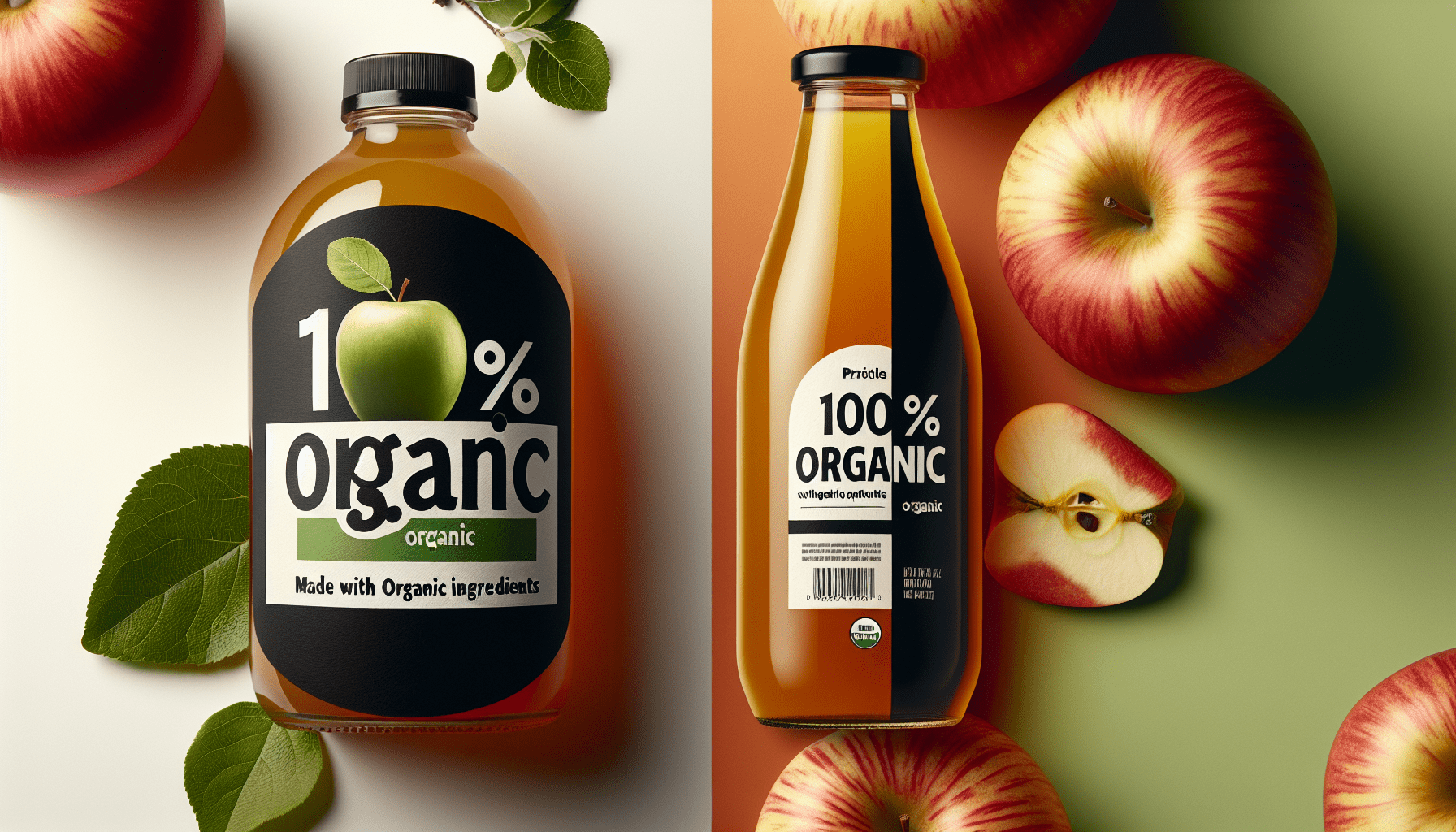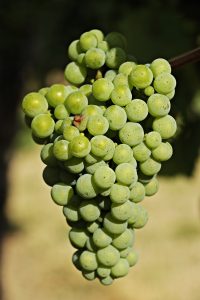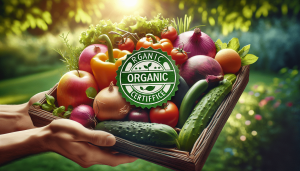If you’ve ever found yourself standing in the grocery store, squinting at labels and trying to decipher the difference between “100% organic” and “made with organic ingredients,” you’re not alone. With the increasing popularity of organic food, it’s important to understand what these terms actually mean. While both imply a certain level of organic content, there are distinct differences that can impact your purchasing decisions. So, let’s break it down and explore the nuances between “100% organic” and “made with organic ingredients.”

Definition
100% Organic
When a product is labeled as “100% organic,” it means that all the ingredients used in its production have been certified organic. This implies that no synthetic fertilizers, pesticides, or genetically modified organisms (GMOs) have been used in the cultivation or manufacturing process. Additionally, any animal-derived ingredients must come from animals that have been raised organically, without the use of growth hormones or antibiotics. Consumers can trust that a product labeled as “100% organic” is entirely free from any artificial substances or chemical additives.
Made with Organic Ingredients
On the other hand, when a product is labeled as “made with organic ingredients,” it means that at least 70% of the ingredients used are certified organic. The remaining 30% can consist of non-organic ingredients, as long as they have been approved for use in organic farming and processing. These non-organic ingredients may include substances like salt, water, and certain additives that are necessary for the product’s functionality or stability. While “made with organic ingredients” products are not entirely organic, they still contain a significant percentage of organic components, offering a healthier alternative to conventional products.
Certification Requirements
100% Organic Certification
To obtain the “100% organic” certification, producers must meet several stringent requirements. These include using only organic ingredients in their products and following strict production practices that adhere to organic standards. They must also undergo regular inspections and audits performed by accredited certification bodies to verify compliance. Any deviation from the established guidelines may result in the loss of certification. This rigorous certification process ensures that products labeled as “100% organic” provide consumers with complete confidence in the organic integrity of the product.
Made with Organic Ingredients Certification
To receive the “made with organic ingredients” certification, producers must meet slightly different criteria. At least 70% of the product’s ingredients must be organic, and the remaining 30% must be non-organic ingredients approved for use in organic products. The producers must also comply with the same strict production practices and undergo regular inspections to ensure adherence to organic standards. The “made with organic ingredients” certification gives consumers assurance that the product contains a significant portion of organic ingredients, promoting transparency and informed choices.

Organic Percentage
100% Organic
When a product claims to be “100% organic,” it signifies that every ingredient used in its development is certified organic. This implies that no compromises have been made, and the entire product is organic, aligning with the principles of sustainability, health, and environmental stewardship. Consumers seeking the highest level of organic purity should look for the “100% organic” label to ensure they are supporting products that meet their ethical and health-conscious values wholeheartedly.
Made with Organic Ingredients
On the other hand, a product labeled as “made with organic ingredients” contains a minimum of 70% organic ingredients. While it does not achieve the same level of organic purity as a “100% organic” product, it still holds a substantial organic component. Choosing products “made with organic ingredients” allows consumers to make a conscious decision to prioritize healthier alternatives while also considering other factors such as availability, price, and functionality. While not entirely organic, these products offer a valuable option to those on the path of embracing organic living.
Ingredients
100% Organic
In “100% organic” products, all the ingredients used are derived from organic sources. This means that the fruits, vegetables, grains, and animal products in these products have been grown or raised without the use of synthetic pesticides, fertilizers, or other chemical inputs. Every step of the production process, from seed to shelf, adheres to the highest organic standards. This guarantees that consumers can enjoy products that are free from harmful residues and ensure that they are supporting sustainable and environmentally responsible agriculture.
Made with Organic Ingredients
In contrast, “made with organic ingredients” products contain a minimum of 70% organic ingredients. The remaining 30% may consist of non-organic ingredients that have been deemed suitable for use in organic products. This flexibility allows for the inclusion of certain substances necessary for the product’s functionality or stability while still providing a significant organic component. While not as stringent as a “100% organic” product, the use of organic ingredients in these products contributes to reduced exposure to synthetic chemicals and supports the growth of organic agriculture.
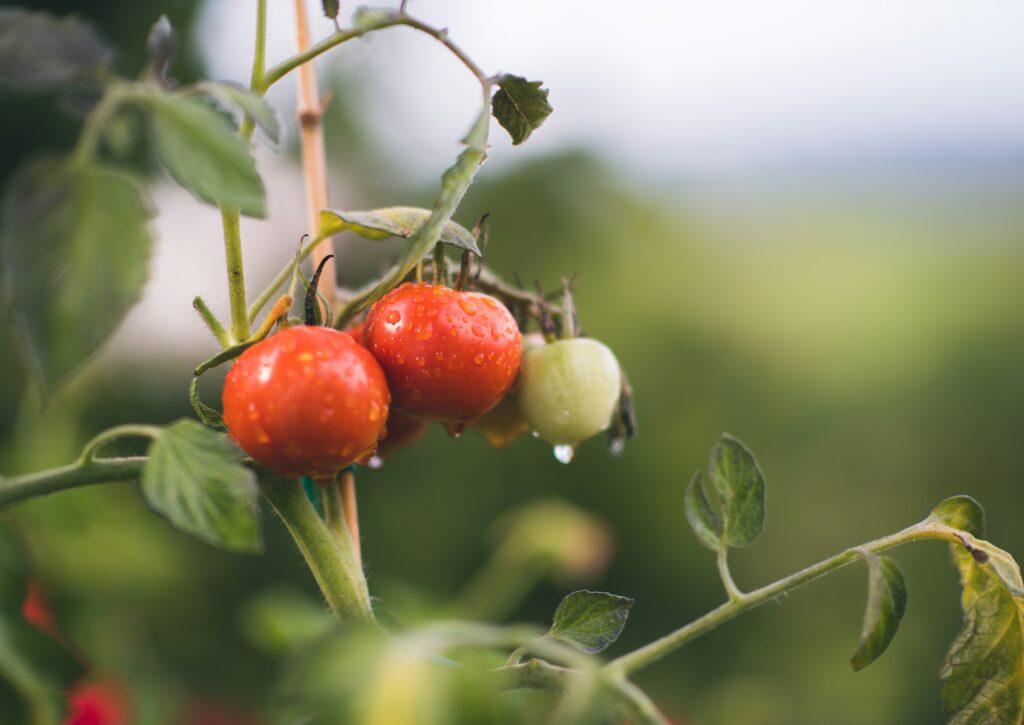
Labeling
100% Organic
Products labeled as “100% organic” prominently display the certified organic logo or the term “100% organic” on their packaging. This clear and recognizable labeling ensures that consumers can easily identify and choose products that meet their organic preferences. The logo or label assures consumers that every ingredient used in the product has undergone rigorous organic certification and testing processes. This labeling transparency empowers consumers to make informed choices for themselves and their families, supporting organic agriculture and healthier lifestyles.
Made with Organic Ingredients
“Made with organic ingredients” products must include the phrase “made with organic ingredients” on their packaging, along with a certified organic logo indicating that the product has met the certification requirements. While the labeling is not as explicit as that of “100% organic” products, it still provides valuable information to consumers. This labeling allows individuals to identify products that contain a significant portion of organic ingredients, even if they do not meet the strict requirements for a “100% organic” label. It encourages consumers to consider healthier alternatives and make conscious choices in line with their values.
Product Quality
100% Organic
“100% organic” products are often associated with superior quality. The absence of artificial additives, chemical residues, and genetically modified ingredients often contributes to a fresher, more natural taste and texture. Additionally, organic agricultural practices promote soil health and biodiversity, enhancing the nutritional value of the crops. The careful cultivation of organic ingredients typically leads to a higher standard of quality, ensuring that consumers receive products that are not only better for their health but also taste remarkably delicious.
Made with Organic Ingredients
While not as strictly regulated, “made with organic ingredients” products also strive for a commendable level of quality. By incorporating a significant portion of organic ingredients, these products benefit from the positive attributes associated with organic farming. The use of organic ingredients may enhance flavor, texture, and nutritional content, offering consumers a satisfying and wholesome experience. While the overall quality may vary depending on the specific product and its ingredients, opting for products “made with organic ingredients” generally results in a higher quality alternative to conventional options.
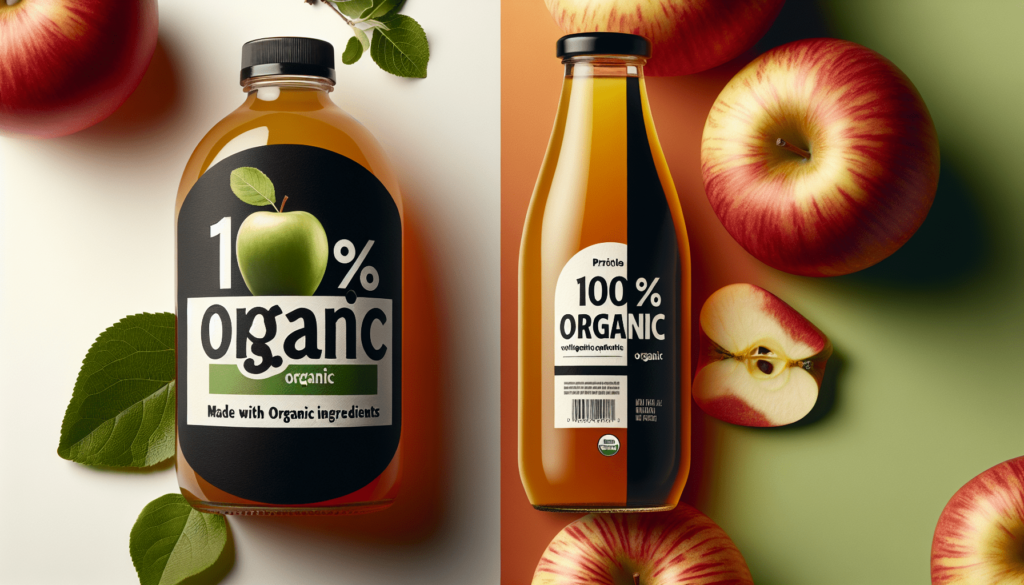
Price
100% Organic
The price of “100% organic” products may be slightly higher compared to conventional products due to the stringent organic certification requirements and the higher costs associated with organic farming practices. Organic farmers prioritize environmentally friendly and sustainable methods, which require more labor, time, and resources. These additional expenses contribute to the price difference, but many consumers are willing to pay a premium for the peace of mind that comes with knowing they are supporting organic agriculture and consuming products that are free from synthetic inputs.
Made with Organic Ingredients
Products labeled as “made with organic ingredients” may have a more affordable price point compared to “100% organic” products. Although these products still contain a significant organic component, the presence of non-organic ingredients allows for a more accessible pricing structure. This makes “made with organic ingredients” products a viable option for consumers who prioritize organic choices but have budget constraints. These products offer an affordable and practical way to incorporate organic alternatives into everyday routines without stretching the budget.
Consumer Perception
100% Organic
The perception of “100% organic” products is often associated with trust, integrity, and a commitment to environmental sustainability. Consumers view these products as a reliable source of organic purity and tend to have confidence in the organic certification process. They appreciate the transparency and clarity provided by the “100% organic” label, empowering them to make conscious purchasing decisions that align with their values. The positive consumer perception surrounding “100% organic” products continues to drive the demand for these offerings and supports the growth of the organic industry.
Made with Organic Ingredients
Products labeled as “made with organic ingredients” are generally perceived as a healthier and more sustainable option compared to conventional products. Consumers value the inclusion of significant organic ingredients, appreciating the effort made to provide products with reduced synthetic inputs. While not meeting the strict requirements for a “100% organic” label, these products cater to a broader range of consumers who still want to make conscious choices but may have specific considerations such as availability or functionality. The perception of “made with organic ingredients” products promotes inclusivity and encourages more people to embrace organic alternatives.
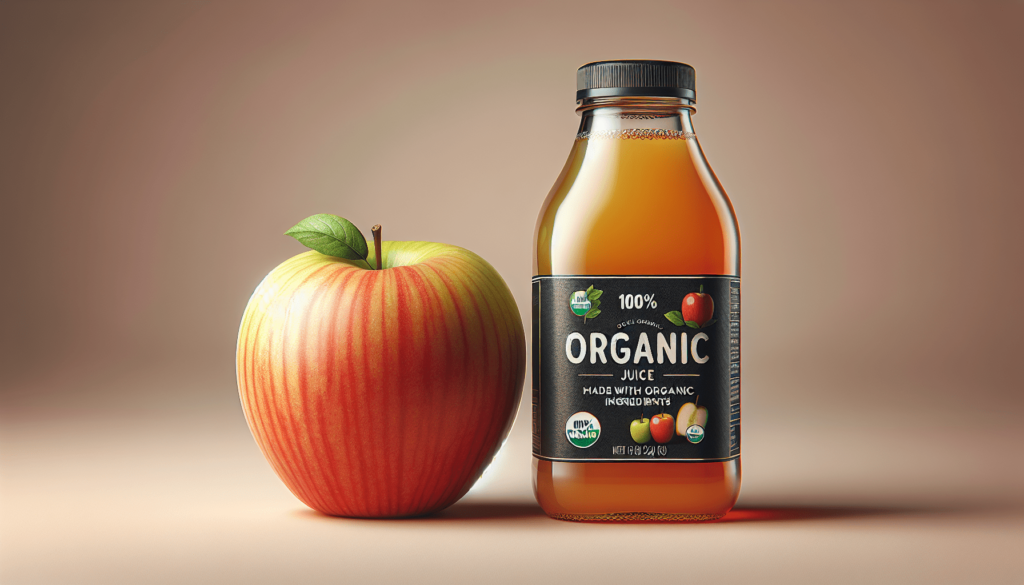
Environmental Impact
100% Organic
“100% organic” products have a significant positive impact on the environment. Organic farming practices prioritize soil health, biodiversity, and ecological balance. By avoiding synthetic fertilizers and pesticides, organic agriculture reduces chemical runoff into water bodies, preserves the integrity of ecosystems, and protects pollinators and wildlife. Additionally, organic farming typically uses fewer non-renewable resources, lowers greenhouse gas emissions, and promotes long-term sustainability. Choosing “100% organic” products supports a more sustainable and eco-friendly approach to agriculture, making a positive contribution to the overall health of the planet.
Made with Organic Ingredients
While not as comprehensive as “100% organic” products, those labeled as “made with organic ingredients” still contribute to a more sustainable future. By including organic ingredients in the production process, these products help reduce the demand for conventional, pesticide-laden crops. This leads to fewer synthetic inputs entering the environment, benefiting ecosystems, and promoting a healthier balance between agriculture and nature. The use of organic ingredients also supports the growth of organic farming, encouraging more farmers to adopt sustainable practices and reducing the overall ecological footprint of the food and consumer goods industry.
Conclusion
Whether choosing products labeled as “100% organic” or “made with organic ingredients,” consumers can make conscious decisions that align with their value for organic living. “100% organic” products provide the highest level of organic purity, ensuring that every ingredient is certified organic. On the other hand, “made with organic ingredients” products offer a substantial organic component, promoting healthier alternatives to conventional products. Both options contribute to the growth and sustainability of organic agriculture while considering factors such as price, availability, and functionality. By supporting organic products, consumers prioritize their health, environmental well-being, and the future of organic farming.

